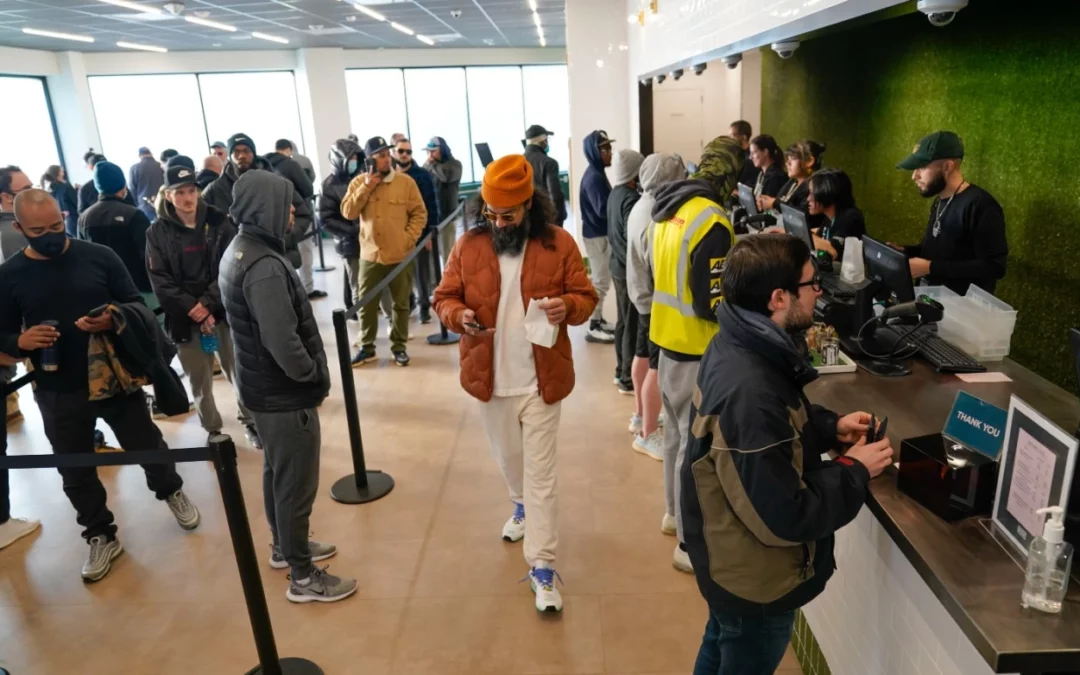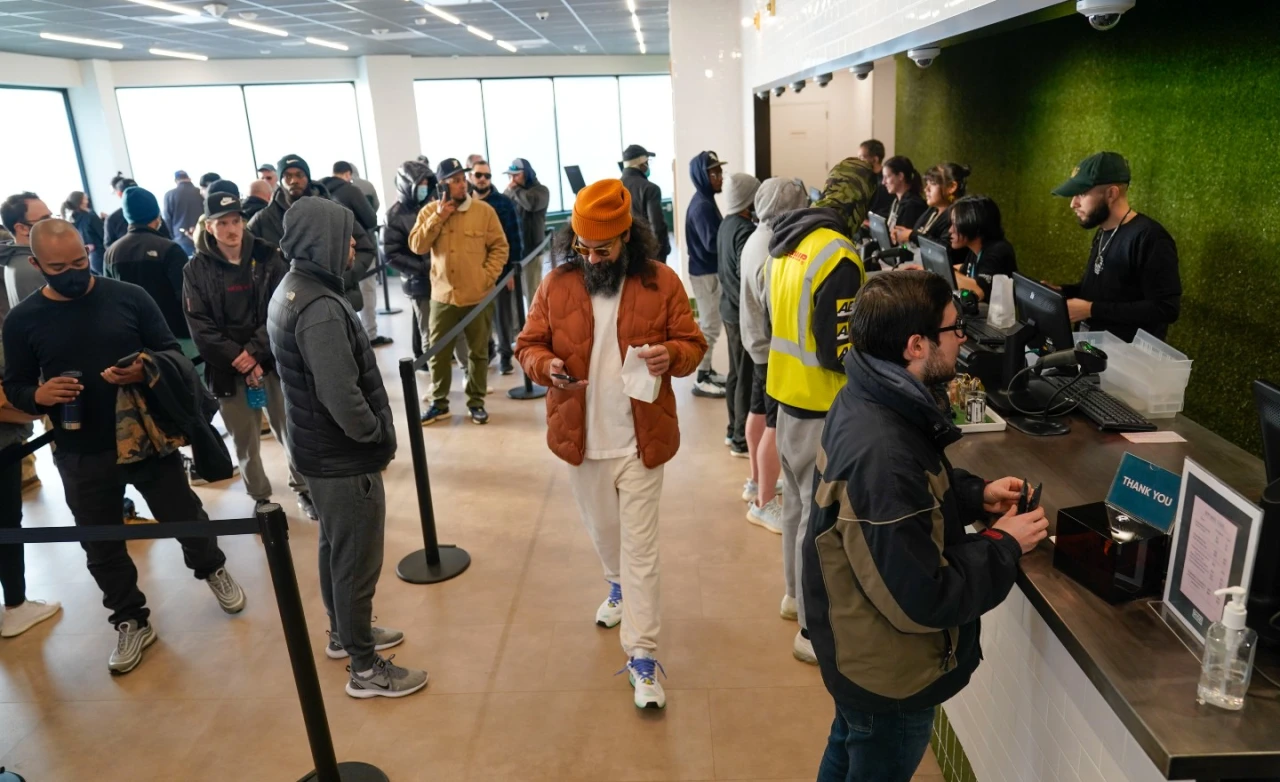
by The Real Dirt | Apr 21, 2022 | 420 Culture & Travel, Blog, Business, Cannabis Business, Cannabis News, Culture, Industry News, Legalization
Thursday April 21, 2022 marks the first day that recreational cannabis can be sold to consumers in New Jersey. Doors opened at the first dispensaries at 6 AM, with lines wrapping around the block.
“It’s a huge event. It’s a moment in time in American history where prohibition 2.0 is lifted,” said Ben Kovler, the chairman and CEO of Green Thumb Industries, which has two facilities opening Thursday, one in Bloomfield and another in Paterson.
However the industry isn’t fully taking off just yet. Just over a dozen “alternative care providers” in the state that were already providing medical cannabis to patients were given permission to sell adult-use cannabis on opening day.
It is still unclear when the hundreds of other cannabis business applicants will get their licenses and be allowed to open their doors, but it will likely start with social equity applicants first.
State regulators say dispensaries in New Jersey are allowed to sell up to the equivalent of 1 ounce of cannabis, which means an ounce of dried flower, or 5 grams of concentrate or 1,000 milligrams of edibles, like gummies. However perishable edibles like cookies and brownies will not be available.
Recreational cannabis sales will still apply the state 6.625% sales tax, with 70% of the proceeds going to areas disproportionately affected by marijuana-related arrests.
New Jersey is the first among several neighboring states to launch recreational cannabis sales. New York legalized cannabis in 2020 but has yet to implement a recreational market. Pennsylvania has a successful medical cannabis industry, with advocates and even legislators pushing for full legalization this year. Connecticut also legalized cannabis but has yet to implement any marketplace for consumers.

by The Real Dirt | Feb 1, 2022 | Blog, Business, Cannabis Business, Cannabis Law, Cannabis Law and Compliance, Cannabis News, Growing, Industry News, Legalization, Politics
In fact, they say they’re bursting at the seams with marijuana — and now, they’re worried they’ll have to take drastic measures if things don’t speed up.
“I hate to say this, but we may have to start destroying product, and we may have to start potentially letting people go because part of the anticipation is you ramp up your staffing, as well,” said James Leventis, an executive for Verano New Jersey, which has a cultivation and processing facility in Readington Township and three stores in Elizabeth, Lawrence Township and Neptune.
“You’re hired for a job with the idea that this market will develop,” said Leventis, the company’s vice president of Compliance & Government Affairs. “I’m very concerned we will continue to see these delays. It’s looking very stark right now.”
Just like any other organic material, cannabis starts to decompose after time. Even after it’s properly stored, after six months weed can get stale, loose its aroma and potency. In worst-case scenarios, the pot can get moldy.
For months, Verano along with fellow New Jersey Cannabis Trade Association members have been pressuring the state to allow them to sell to the public. The strategy has increased over the last month.
So what’s the hold up?
In no uncertain terms, the state agency created to govern the nascent cannabis industry — the Cannabis Regulatory Commission — has said these same companies demanding to open have yet to comply with stipulations in the marijuana law.
“The law has been in place since Feb. 22, 2021,” said Jeff Brown, the CRC’s executive director at last week’s public meeting. “It has noted clearly that alternative treatment centers [like Verano] need three things: municipal approval, relevant necessary supply to be able to serve their patient base, and operational capacity to continue to serve and even expand access.”

by The Real Dirt | Dec 16, 2021 | Blog, Business, Cannabis Business, Cannabis Law and Compliance, Cannabis News, Industry News, Legalization
The Murphy Administration began accepting applications from cannabis growers, product manufacturers and testing labs on Wednesday — the first step that will usher in the legitimate marijuana industry New Jersey voters endorsed in a referendum 13 months ago.
Within four hours of the application portal going live 9 a.m. Wednesday, 500 people had established accounts, Jeff Brown, executive director for the Cannabis Regulatory Commission announced. By the end of the business day, 635 had created accounts, commission spokeswoman Toni-Anne Blake said.
“We are happy to reach this milestone,” Brown said in a statement. “Applications are coming in, the platform is performing well, and we can officially mark the launch of the state’s recreational cannabis industry.”
The commission will start accepting applications for dispensary owners, the retail shops that will sell the cannabis products, on March 15. There are no deadlines; applications will be accepted and reviewed on a continuous basis, the commission said.
Applicants who are owned by women, minorities and veterans will get reviewed and approved first, as well as from those who have been convicted of marijuana offenses and people from poor communities, the commission has said. One of the goals behind legalizing the sale and possession of weed is to lessen the harm on Black and brown people, who have been more than three times more likely to face arrest and conviction than white people, even though usage rates are the same.
Under the cannabis legalization law signed in February by Gov. Phil Murphy, the commission created the Office of Minority, Disabled Veterans, and Women Business Development to promote diversity.
The commission also created a category for Social Equity Business applicants, defined as entities “owned by people who have lived in an economically disadvantaged area or who have convictions for cannabis-related offenses.”

by Travis C | Sep 28, 2021 | Blog, Business, Cannabis Business, Cannabis Law, Cannabis Law and Compliance, Cannabis News, Industry News, Legalization, Politics

Nearly a year after passing a constitutional amendment to legalize cannabis, New Jersey has yet to open a single retail cannabis store. While the industry has yet to take off, that isn’t stopping regulators from preemptively banning one of the most popular cannabis products.
When it comes to the cannabis products that consumers want, flower remains king. Vaporizer pens and concentrates for dabbing have been slowly catching up with flower as consumers seek a quicker way to get the desired effects of cannabis without burning the plant itself.
However, cannabis edibles have also been gaining popularity. Avoiding the need for any sort of inhalation at all, edibles are great for consumers who don’t want to vape or smoke, but still want the effects of cannabis.
Cannabis beverages have seen the greatest growth since the beginning of 2020, when cannabis sales skyrocketed across the country due to the COVID-19 pandemic. Cannabis capsule products have also grown noticeably in popularity, showing that consumers are seeking a way to consume cannabis without, well, consuming traditional cannabis.
With such growth in the edible cannabis market, it would seem obvious to any potential industry that is about to open that edibles will be a high-demand product. Higher demand means higher profits, which is what any state is seeking when legalizing cannabis.
Unless you’re New Jersey.
Ban on almost all cannabis edibles
Despite having no functional legal cannabis industry to base their decision, regulators in charge of New Jersey’s recreational cannabis have decided to ban all forms of edible cannabis products except for lozenges. This means traditional products consumers would likely be familiar with — cookies, brownies, gummies, beverages — are all prohibited.
The reasoning behind the ban is the same used by many states when they first legalize; the children. Concern over edible products that might appeal to children is a consistent issue in the legal cannabis industry.
While other states passed new regulations requiring child-proof packaging and prohibiting edibles from being designed in a manner that would be appealing to kids (i.e. gummy bears, star-shaped cookies, etc.), New Jersey has decided to take a much more restrictive approach.
According to the new set of regulations passed by New Jersey cannabis regulators, “ingestible forms of cannabis… shall only include syrups, pills, tablets, capsules, and chewable forms.”
A growing and thriving grey market
Just because regulators are dragging their feet in getting a functional legal cannabis industry up and running doesn’t mean that the people aren’t already taking advantage of the new law. Seemingly taking a tip from the Washington D.C. playbook, New Jersey has begun to develop a thriving grey market industry.
While there is nowhere to legally buy or sell cannabis directly, there’s a workaround. Similar to how D.C.’s grey market operates, New Jersey currently has a gift/donation system in place to skirt the current regulations.
In this grey market, a consumer may find a delivery service online. One the website one might see several different cannabis products, or “packages” as they might be called. However that isn’t technically what the consumer is buying.
Instead, the cannabis product is simply a “gift” that is included with the purchase of another item on the website. This might be a sweatshirt, a t-shirt, or even something as small as a sticker. The price of the sticker may be around $40, which conveniently is the same price as an eighth of cannabis.
Within a couple hours, a delivery driver will be at the door with the sticker and the included gift, and bam you just “bought” legal cannabis in New Jersey. But just like D.C.’s grey market, the grey market in New Jersey is completely unregulated.
Although a legal cannabis company has to follow strict regulations on manufacturing and packaging, an unregulated market like that which is blooming in New Jersey has no such restrictions. So while regulators may think they are making progress by banning various forms of edible cannabis products, these new rules will be all but ignored by those operating in the grey market already.
In other words, the new regulations can’t possibly have any sort of impact until there is an actual legal industry to enforce them. As regulators take their time getting the legal cannabis industry up and operational in New Jersey, the grey market will continue to thrive only making it more complicated to get legitimate businesses licensed and running.
If you are interested in learning more about the New Jersey cannabis industry, need assistance with licensing, planning and implementation of your business plan, Greener Consulting Group can help you stay on top of the latest regulatory changes, fees and best practices for getting ahead of the competition when the industry takes off.














